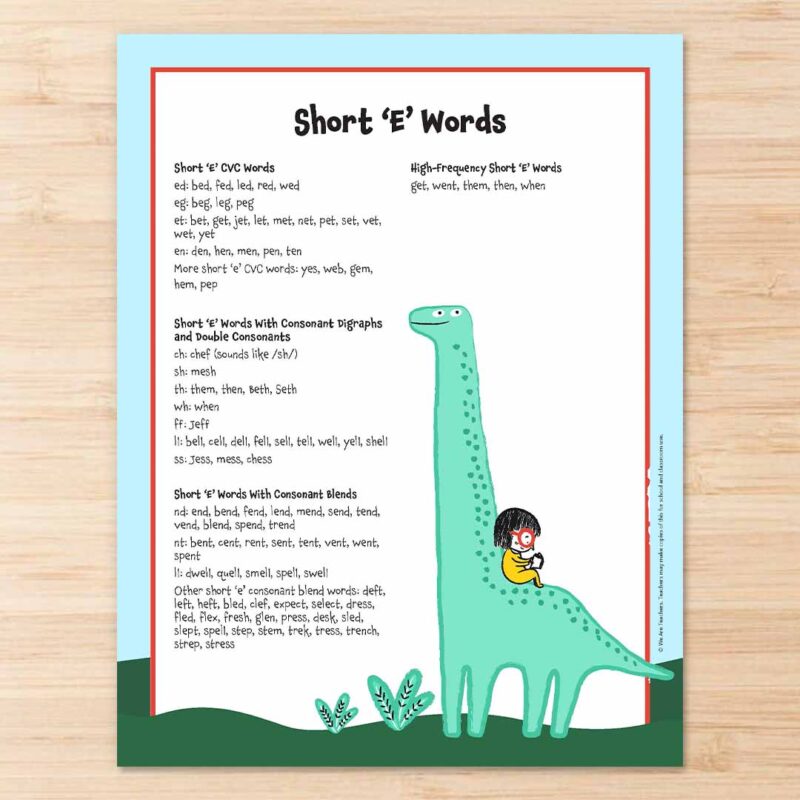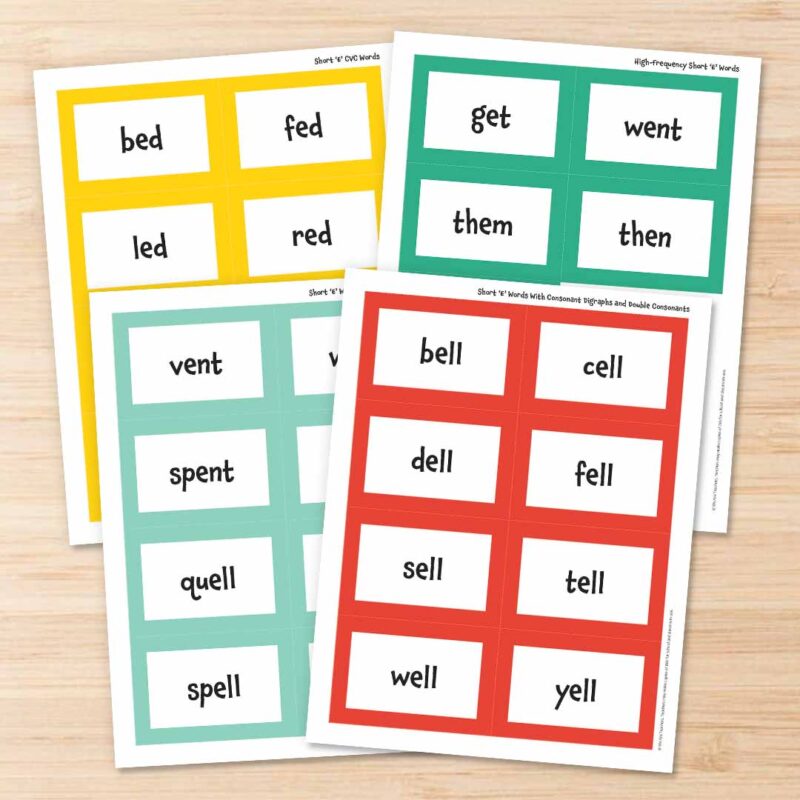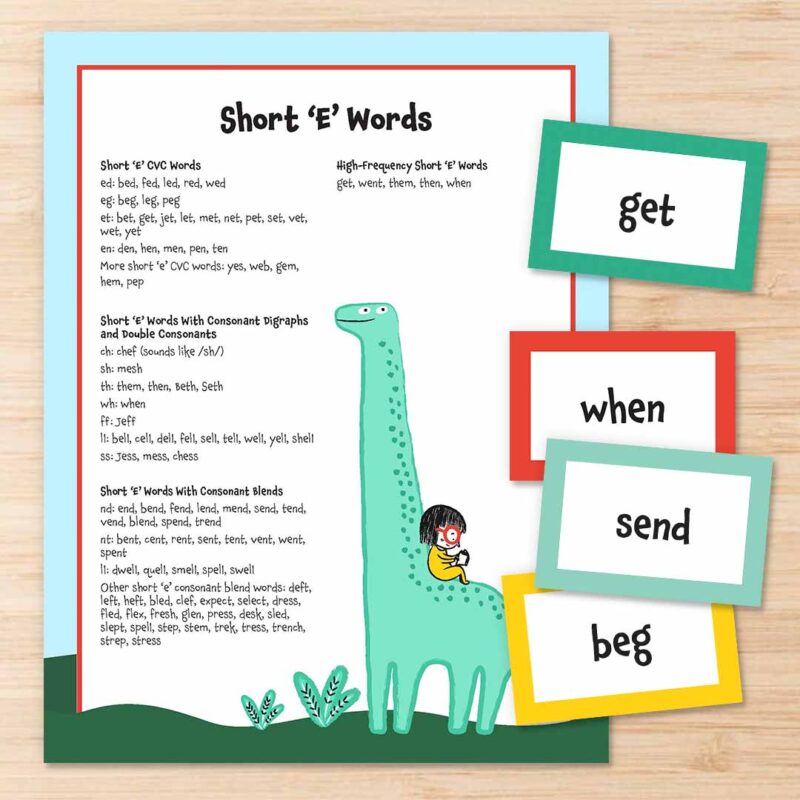Teaching each short vowel sound is a key part of any phonics scope and sequence for kids. Having lots of examples of short ‘e’ words on hand will help you give students plenty of practice hearing, reading, and writing the sound. You can move your way through the sections of this list as students learn more consonant sounds and patterns. Remember to make sure students know what each word on the list means!
Grab our free printable short ‘e’ word list and cards. Then try some of the activities below.
Jump to:
Teaching the Short ‘E’ Sound
It’s important to use a reliable keyword to introduce the short ‘e’ sound and help students remember it. “Ed,” “edge,” and “echo” are good ones. “Egg” can be confusing since some accents pronounce it with a long ‘a’ sound like “ay-gg.” “Elephant” can also be confusing since it can be tough to isolate the short ‘e’ from the ‘l’ sound.
Short ‘e’ can be tricky for some kids to distinguish from short ‘i.’ In some accents, “pin” and “pen” sound the same. It helps to emphasize mouth position for articulating the short ‘e’ sound: “eh.” Have students look in the mirror while producing it. Help them notice how the lips open and pull back like a smile, and the chin must drop a bit more than when producing the short ‘i’ sound.
Short ‘E’ CVC Words

These short ‘e’ words follow the consonant-vowel-consonant (CVC) pattern. Use words that include consonant sounds students have been taught.
ed: bed, fed, led, red, wed
eg: beg, leg, peg
et: bet, get, jet, let, met, net, pet, set, vet, wet, yet
en: den, hen, men, pen, ten
More short ‘e’ CVC words: yes, web, gem, hem, pep.
Short ‘E’ Words With Consonant Digraphs and Double Consonants
Once students know the consonant digraphs ch, sh, th, and wh, they can practice with the digraph words below. When they learn how one-syllable short vowel words ending in f, l, s, or z have double consonants, they can practice reading and writing those words too.
ch: chef (sounds like /sh/)
sh: mesh
th: them, then, Beth, Seth
wh: when
ff: Jeff
ll: bell, cell, dell, fell, sell, tell, well, yell, shell
ss: Jess, mess, chess
Short ‘E’ Words With Consonant Blends
When students can work with two or more consonant sounds blended together, they’ll be ready for reading and writing the short ‘e’ words below. (Some of the words listed also include consonant digraphs, double consonants, or more than one blend.)
nd: end, bend, fend, lend, mend, send, tend, vend, blend, spend, trend
nt: bent, cent, rent, sent, tent, vent, went, spent
ll: dwell, quell, smell, spell, swell
Other short ‘e’ consonant blend words: deft, left, heft, bled, clef, expect, select, dress, fled, flex, fresh, glen, press, desk, sled, slept, spell, step, stem, trek, tress, trench, strep, stress
High-Frequency Short ‘E’ Words
The most effective way to teach high-frequency words—words used most often in print—is by calling students’ attention to the letters and sounds in the word. Many high-frequency words are actually phonetically regular. These high-frequency words fit right into lessons about words with the short ‘e’ sound:
get, went, them, then, when
(Find lots of ideas for teaching high-frequency words with these 55 Fun Sight Word Activities That Work.)
How To Use the Word List and Cards

There are many easy ways to practice reading and writing words with the short ‘e’ sound. Choose a couple and teach them as routines; you can use the same directions for words with other sounds. Be sure students know what the words you use for each activity mean. Find more activities for teaching short vowel words in our short ‘a’ word list!
Map Sounds in Words
Orthographic mapping is the mental process that happens when human brains link the letters and sounds in a word and store them permanently. Mapping sounds in words can help this process along: Say a word from the short ‘e’ list, help students isolate each spoken sound, write letters to match the sounds, and read the word. For a full description of phoneme-grapheme mapping, check out Susan Jones Teaching’s video about it.
I Spy Words
Display a set of word cards. Say the sounds in a word, say a word, or give a clue about the meaning of a word, and have students find the correct word in the display. Make it fun by giving them real or paper magnifying glasses to use.
Sound Stomp
Have each student stand in front of a small set of word cards on the floor. Say the sounds in one of the words. Have them repeat the sounds while stomping one foot for each sound. Then have them jump onto the correct word card while saying the word.
Headband Words
Clip word cards to headbands for students to wear. Have students rotate around the room reading others’ headbands, or have partners read each other’s word secretly and give clues for each person to guess the word on their headband.
Feed the Monster
Make two or more “monsters” out of empty tissue boxes or other containers. Mark each monster with a word family it “likes to eat.” Give students a set of word cards that include two or more word families (e.g., -en and -et or -end and -ent). Have them read each word and “feed” it to the correct monster.
Follow the Path
Have pairs of students create a path on the table or floor using a deck of word cards and signs for “Start” and “End.” Partners can take turns rolling a die and walking (or moving a game piece) as they read the words on the path to move ahead.
Puppet Writing
Use a silly puppet to say the sounds in a word or just the word. Have students listen and write the word on a dry-erase board. Dramatically have the puppet “check” their spelling and cheer for their success.
Sentence Reading
Write sentences using words with short ‘e’ and other high-frequency words students have learned (like “the,” “is,” or “on”). Students can read sentences individually, or they could read each sentence to a partner, have the partner write it, and then work together to check it.
Get Your List of Short ‘E’ Words

Print copies of the word list and cards to keep on hand for spelling lists, teaching examples, and for games and activities like the ones above.